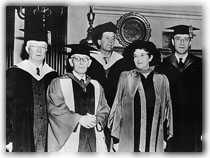Main Menu · Search ·Current Issue ·Contact ·Archives ·Centennial ·Letters to the Editor ·FAQs
 Helen Maud Cam, Harvard's first tenured woman, with fellow historians W.S. Ferguson, S.E. Morison, and W.K. Jordan. |
Harvard's new banner debuts in front of University Hall. The old banner had been incorrect by heraldic standards because it bore Harvard's seal. The new banner properly bears only the University arms: Gules, three open books (Argent), edges, covers, and clasps (Or), on the books the letters ve ri tas (Sable).
Ada Louise Comstock, dean of Smith College, becomes Radcliffe's third--but first full-time--president.
"A new function is developing" for the Harvard Summer School, state the Bulletin's editors. "Thoughtful adults are discovering that the rapidly changing life of this dynamic world makes education a continuous process which can never be completed at any specified age or date. Many such are turning to the summer school for opportunities to continue their intellectual growth, to increase their aesthetic enjoyment, and to gain new vitality for the obligations of modern life."
Constitutional historian Helen Maud Cam of the University of Cambridge becomes Harvard's first female full professor as the inaugural incumbent of the new Samuel Zemurray Jr. and Doris Zemurray Stone-Radcliffe Professorship, restricted to outstanding women scholars from any field.
Harvard University Press publishes Flying Saucers, by Paine professor of practical astronomy Donald H. Menzel. Warning that the "exploitation of the minds of the American public, feeding them fiction in the guise of fact under the protection of a free press," could start a serious panic, he analyzes alleged saucer sightings and debunks them as "reflections from material objects," "rags and tags of meteorological optics," unusual forms of shooting stars, or phenomena related to the aurora.
Due to several miscalculations, a $72,000 Xerox Copyflo is installed in Widener only after a 12-man crew hoists up the huge, steel-frame machine by crane, swings it over the library's roof, lowers it to D-level of the inner courtyard, and pushes it through a window. (The formerly off-site machine had produced an eight-fold increase in reproductions, including copies of books printed on deteriorating stock.)
Following the assassination of Martin Luther King Jr., the Association of African and Afro-American Students calls on Harvard to establish an endowed chair for a black professor, hire more black junior faculty, create courses relevant to blacks at Harvard, and admit blacks in proportion to their percentage of the population as a whole.
A proposal to reform the College calendar would bring freshmen to Cambridge before Labor Day, end first semester before Christmas, and end second semester in mid May. [Faculty members reject it.]
At its March and April meetings, the Faculty of Arts and Sciences discusses the proposed "Core Program," described by its chief proponent, Dean Henry Rosovsky, as "not [going] back to basics--I detest that phrase--but forward to modern liberal education."